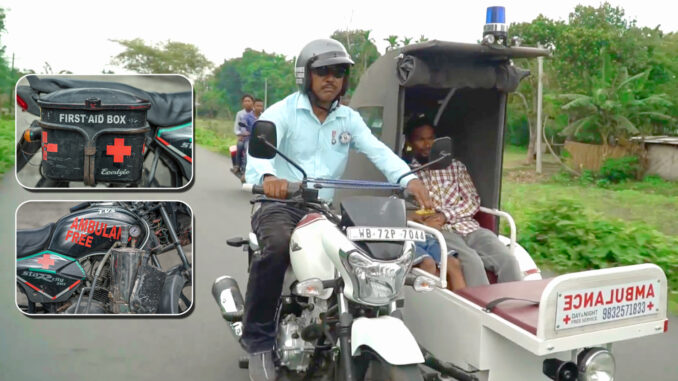
The mother of Karimul Haque, from the West Bengal village of Dhalabari, was unable to be saved since she was late arriving at the hospital. Karimul Haque, 57, had to decide whether to try to forget the tragedy or meaningfully preserve his mother’s memories after this unexpected loss. Karimul made the decision to borrow money to purchase a motorcycle and begin assisting his community by getting sick patients to hospitals on time. He began aiding anyone in need of quick emergency care, including those injured in vehicle accidents, those with health issues, and everyone else. He now goes by the name “Bike-Ambulance Dada” and offers free ambulance bike ferry service around the clock to make it easier for villagers to go to medical facilities quickly.
Who Is Ambulance Dada?
Karimul Haque takes great pride in the wild surroundings around his house. A forest known for its one-horned rhinoceros, which rangers are actively protecting, sits on one side and a lush green tea garden on the other. In the Jalpaiguri district of West Bengal, Haque, a formerly employed tea garden worker, is hard at work in his own unique way, providing emergency medical care for people.
Ambulance-Dada: How The Journey Begins?
Karimul Haque experienced a tragic episode that forever changed his life in 1995 when he could not find an ambulance to transport his ailing mother to the hospital. Finally, his mother suffered a cardiac arrest and died. As a result, he made the decision to help others in the event of a medical emergency. When one of his coworkers suddenly collapsed in 1998, Karimul attached him to his back and sped to a neighboring hospital on a motorcycle. This is when the concept of a motorcycle ambulance first entered his head. After this experience, he made the decision to start his motorcycle ambulance business and borrowed money to purchase his own motorcycle. He has aided more than 7,000 people in need of medical assistance while operating motorcycle ambulances since 1998 in more than 20 adjacent areas. He not only offers ambulance services but also basic first aid instruction to the locals with the assistance of doctors.
Ambulance Dada: The Transformation
The free ambulance was once merely a motorcycle pulling a sick-carrier that resembled an iron box when it was first introduced. The bike now features a more modern sidecar for the patient that is equipped with an oxygen tank. Two motorcycles and an equal number of four-wheeler vans are used by the service to transport three to four patients each day. The bikes and ambulances also have a mobile phone number shown. Haque continues to operate his “motorcycle ambulance” 16 years after he transported his first patient to the district hospital in Jalpaiguri.
Bike Ambulance Dada: The Book
Karimul Haque, 57, was the third of his parents’ six children and was born in Dhalabari. His mother and father were agricultural laborers, so he dropped out of school early to work odd jobs at a local tea garden. According to Biswajit Jha, a former journalist who authored a biography of Haque two years ago, “He, perhaps, studied until Class III.” Jha’s book, Bike Ambulance Dada: The Inspiring Story of Karimul Haque (Penguin India, 2021), chronicled Hak’s journey as a humanitarian driven to aid the underprivileged and destitute. The book received its first Malayalam translation last year.
Ambulance Dada: Awards And Milestones
The government of India awarded Karimul Haque the Padma Shri in 2017 for his social services. Star cricketer Virat Kohli, well-known wrestler Sakshi Malik, and eminent scientist Madan Madhav Godbole were among the recipients of the award that year. He has won numerous honors, including the 2012 Ananya Samaan from the 24 Ghanta News channel of the Zee Group. He learned how to take a selfie from Indian Prime Minister Narendra Modi in 2018 at Rashtrapati Bhavan on the eve of Republic Day. He was also invited to participate in a special Karamveer episode of “Kaun Banega Crorepati 12” in 2021. A Bollywood biopic is planned for release after Jha’s book on the subject. Haque recently inked a contract with a Mumbai-based producer for a Hindi film about him.
For the mostly tribal town of Dhalabari, the ambulance service has expanded to include a hospital, a nurse training facility, and a sewing institute, all on Haque’s little family land. In 2017, the Indian PSU major Indian Oil Corporation and the MNC Bajaj Group donated enough money to purchase a generator that will power Haque’s hospital and training facilities with electricity. A water tank was donated a year later by the Kolkata-based NGO, Society for Technology with a Human Face, and the Tagore Sengupta Foundation, a non-profit organization in Pennsylvania, the US.
Bureau Report
Leave a Reply